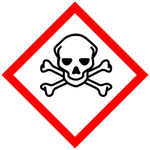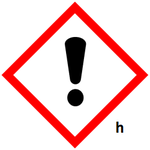Contents
Key Stage 3
Meaning
A hazard is something that could be dangerous.
About Hazards
- Something which is hazardous may be unsafe if used incorrectly.
- When dealing with hazards the danger can be reduced by taking precautions.
Examples
| Toxic | Flammable | Harmful | Irritant |
| A toxic substance is one that is so poisonous it could kill a human. | A flammable substance is one that can catch on fire easily. | A harmful chemical is one that can cause damage to an organism. | An irritant is a substance that can cause itching and pain to the skin, eyes or lungs |
| Corrosive | Long Term Health Risk | Dangerous to the Environment | Explosive |
| A corrosive substance is one which can break down other materials or damage the skin. | Chemicals that are a long term health risk cause non-communicable diseases if they are used repeatedly over long periods of time. | A chemical that is dangerous to the environment can kill organisms other than humans. | An explosive substance is one which can react very quickly, without needing oxygen from the air, that produces a lot of gas during the reaction. |
| Oxidising Agent | Compressed Gas | Biohazard | Ionising Radiation |
| An oxidising agent is a chemical that causes the oxidation of other chemicals. | Compressed Gas is when a gas is held under high pressure in a container. | A biohazard is something which contains pathogens which could cause disease. | Ionising Radiation is radiation which can cause atoms to lose electrons and become ions. |
| Danger of Electrocution | LASER Radiation | ||
| A danger of electrocution is when there is electricity at such a large potential difference that it could pass through a living organism. | LASER Radiation is an extremely intense beam of light. |
Key Stage 4
Meaning
A hazard is something that could cause harm to living organisms.
About Hazards
- Something which is hazardous may be unsafe if used incorrectly.
- When dealing with hazards the danger can be reduced by taking precautions.
Examples
| Toxic | Flammable | Harmful | Irritant |
| A toxic substance is one that is so poisonous it could kill a human. | A flammable substance is one that can catch on fire easily. | A harmful chemical is one that can cause damage to an organism. | An irritant is a substance that can cause itching and pain to the skin, eyes or lungs |
| Corrosive | Long Term Health Risk | Dangerous to the Environment | Explosive |
| A corrosive substance is one which can break down other materials or damage the skin. | Chemicals that are a long term health risk cause non-communicable diseases if they are used repeatedly over long periods of time. | A chemical that is dangerous to the environment can kill organisms other than humans. | An explosive substance is one which can react very quickly, without needing oxygen from the air, that produces a lot of gas during the reaction. |
| Oxidising Agent | Compressed Gas | Biohazard | Ionising Radiation |
| An oxidising agent is a chemical that causes the oxidation of other chemicals. | Compressed Gas is when a gas is held under high pressure in a container. | A biohazard is something which contains pathogens which could cause disease. | Ionising Radiation is radiation which can cause atoms to lose electrons and become ions. |
| Danger of Electrocution | LASER Radiation | ||
| A danger of electrocution is when there is electricity at such a large potential difference that it could pass through a living organism. | LASER Radiation is an extremely intense beam of light. |













